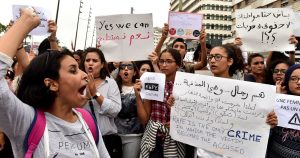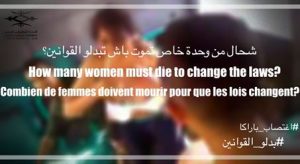The Moroccan Feminist Movement is Fighting Rape Culture
Hundreds of Moroccan women participated in a protest to condemn the sexual assault of a  woman on a public bus on the 21st of August 2017. The incident, which was filmed and published on several social media platforms, led to debates on the safety of women in public places and the available laws to protect them. The protesters called for practical law changes to ensure the safety of women in public spaces, chanting and holding signs such as “We are not afraid! We want to liberate public space!”
woman on a public bus on the 21st of August 2017. The incident, which was filmed and published on several social media platforms, led to debates on the safety of women in public places and the available laws to protect them. The protesters called for practical law changes to ensure the safety of women in public spaces, chanting and holding signs such as “We are not afraid! We want to liberate public space!”
Kenza Belhanesh, a member of the feminist collective ‘Al Fam’, and one of the protest organizers, spoke to “The Regional Coalition of Women Human Rights Defenders in the Middle East and North Africa” about the need to reclaim public places. To achieve this, “we must challenge harassment and threats to women in the streets and public spaces.” She pointed that many women who participated in the protest had been photographed and subjected to online bullying and had their pictures posted on several Facebook pages and groups and received many hate messages and rape threats, which intimidated them. The group is working on a campaign to combat harassment in order to lobby for amending local laws that punish the survivor.
“L’Union Féministe Libre”, a member of “The Regional Coalition of Women Human Rights Defenders”, launched a campaign against sexual harassment and assault in public spaces under the slogan “How many women should die until we change the laws?” They called for a sit-in in front of the Moroccan parliament to change laws that justify sexual abuse and violence.
The association “ADALA – the right to a fair trial”, launched a petition and collected signatures to pressure the Moroccan authorities and highlight the laws that deny assaultt and rape survivors of their rights, and put all women at risk of assault at any time and place. The petition states that “two out of three women are subject to sexual violence in Morocco. In this sense, sexual assaults are not random accidents but nightmares that have long been turned into reality. In Morocco, women have no law to criminalize sexual violence they face and no laws to protect them”.
There have been campaigns in Morocco in recent years aimed to combat sexual harassment in public places. According to the latest statistics, two-thirds of women in Morocco say they are subjected to “physical, psychological, sexual or economic abuse”.
“The Regional Coalition of Women Human Rights Defenders in the Middle East and North Africa” express its solidarity with Moroccan feminists and defenders who fight the physical, sexual and mental abuse of women in Morocco and are working hard to develop laws, plans and strategies to protect women in their country. The coalition also calls on the Moroccan authorities to listen to the demands of Moroccan feminists and WHRDs instead of silencing them.


